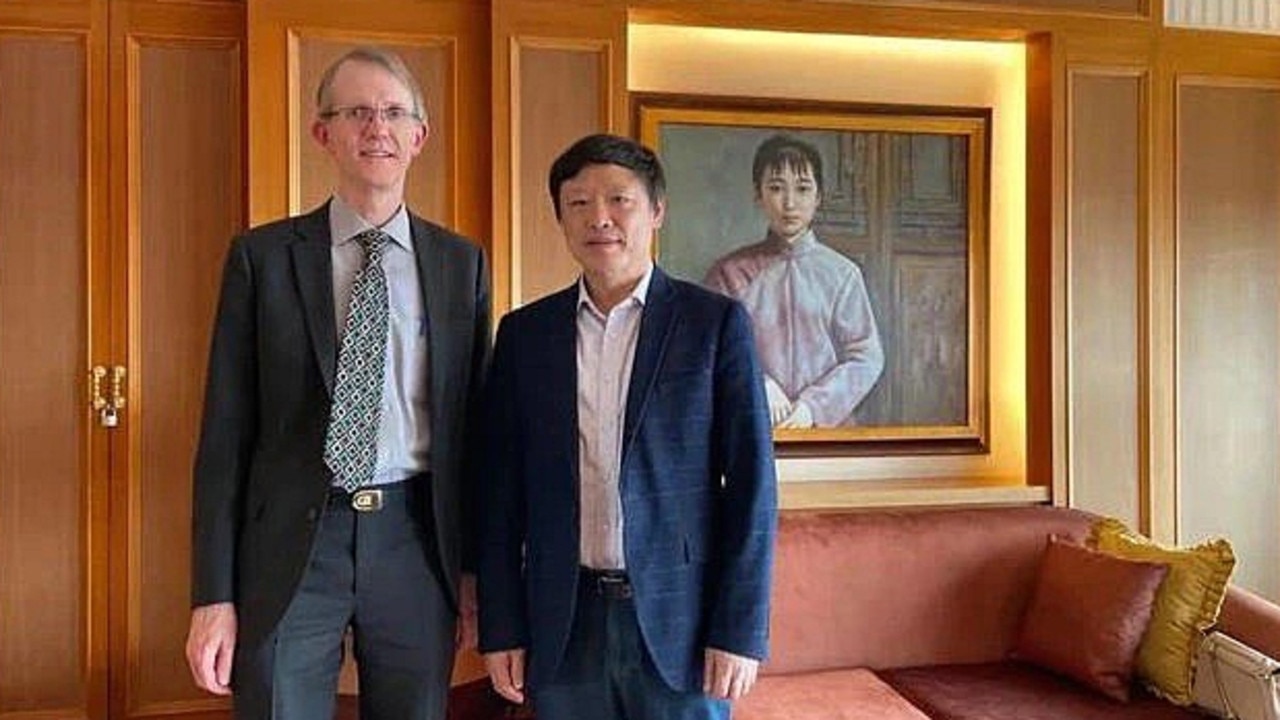Controversial editor of Communist Party mouthpiece ‘invited to lunch’ by Australian ambassador in Beijing
The controversial editor of a Communist Party mouthpiece, who frequently attacks Australia, has been taken out to lunch by our ambassador in Beijing.
The controversial editor of a Communist Party mouthpiece, who once called Australia “gum stuck to China’s shoe”, has boasted about being invited to lunch by the Australian ambassador in Beijing this week.
Global Times editor-in-chief Hu Xijin said ambassador Graham Fletcher had invited him to dine with him on Wednesday, one day before China slapped a further 6 per cent tariff on Australian wine, The Australian reported.
Beijing has placed a series of punishing trade sanctions on Australian products including wine, beef, barley and timber in recent months, in retaliation for the Morrison government’s push for an inquiry into the origins of COVID-19 and opposition to China’s expansion in the South China Sea.
Mr Hu revealed details of the meeting on his personal Weibo account, where he boasted to his 24 million followers that he had told Mr Fletcher that Australia was “the most unfriendly country besides the United States”.
“I was invited to have lunch with the Australian Ambassador to China Mr Graham Fletcher,” Mr Hu wrote. “China-Australia relations are so tense now, I believe it is not easy to be an ambassador to China now.”
A perfect picture of hypocrisy/Global Times Cartoon pic.twitter.com/o64bN19QWr
— Hu Xijin 胡锡进 (@HuXijin_GT) December 2, 2020
Mr Hu recently suggested Scott Morrison should “slap himself in the face” after he demanded an apology from China over a doctored image of an Australian soldier holding a knife to an Afghan child’s throat.
The paper, which also published its own cartoons mocking Australian soldiers and the Prime Minister, has been one of Australia’s most vocal critics, describing the country as a “lackey” and a “giant kangaroo that serves as a dog of the US”.
In his account of the embassy meeting, Mr Hu said he had told Mr Fletcher he was particularly unhappy about Australia freezing out Chinese telecommunications company Huawei from the construction of the 5G network, and new foreign interference laws.
“On the South China Sea issue, it has jumped higher as an extra-regional country than an intra-regional country,” Mr Hu said he told Mr Fletcher. “He asked me to note that Australia’s attitude on many issues related to China is different from that of the United States.”
Mr Hu said Mr Fletcher had “emphasised that Australia hopes to improve relations with China”.
“At the same time, he also said that Australia is an ally of the United States and this cannot be changed,” he said.
“I am afraid Australia needs to really change its attitude towards China and make adjustments in its actions, instead of helping the United States bite China while making a cheap statement of ‘take no sides’. Otherwise, I predict that China-Australia relations will hardly pick up, and Australia will continue to pay the price for its unreasonable China policy.”

A Department of Foreign Affairs and Trade spokesman confirmed the meeting in a statement to news.com.au.
“Our ambassador met the editor of the Global Times and set out Australia’s clear policies in relation to China and on the US alliance,” he said.
“The meeting took place outside the embassy and was part of a wider set of engagements with Chinese media outlets to ensure Australia’s views are conveyed directly. Australian officials must engage with arms of the Chinese government, including state-controlled media, to project Australia’s national interest-based positions.”
He added, “Australia rejects the inaccurate and inflammatory coverage of Australia by the Global Times.”
After the meeting, the Global Times published an editorial mirroring Mr Hu’s comments, in a slight softening of tone.
“What’s surprising is that China and Australia have seemingly fallen afoul of each other for no reason at all,” it said.
“They have no historical feud or enmity, but have developed sound trade. There are enough reasons and resources for the two countries to maintain a friendly and cooperative relationship for a long time.”
Nevertheless, tensions continued to simmer this week, as Trade Minister Simon Birmingham warned Australia was considering taking China to the World Trade Organisation over its actions.
“Australia is not the only country that has seen these types of punitive measures and I expect the rest of the world will be watching quite closely what is happening in Australia,” he said.
Meanwhile, The Australian reports that more than 80 coal ships carrying cargo worth more than $1.1 billion are now sitting off the Chinese coast as a result of a “go-slow” by officials, crunching Australia’s second biggest export industry.
And in an editorial on Thursday, the Global Times warned that iron ore, Australia’s biggest export, was “not completely immune”.
“There is no denying that iron ore remains the commodity that China needs to buy in bulk from countries like Australia and Brazil,” it said.
“In 2019, China imported 1.04 billion tons of iron ore, including 660 million tons from Australia. During the first 10 months of this year, Australian iron ore accounted for 62 per cent of all imports to China. And with the sustained economic recovery from the epidemic, China’s demand for iron ore is expected to stay brisk.”
But the Global Times said it was “wishful thinking that iron ore could be an exception in ongoing China-Australia trade rows”, pointing to the recent rapid rise in iron ore prices in part caused by those tensions.
“If iron ore prices continue to soar, resulting in turmoil in the industry, more calls for regulatory interventions should be expected,” it said.
“If a price surge really disrupts the industry and market, then the government holds responsibility for maintaining price stability. (Amid) heightened tensions between China and Australia, any move aiming at stabilising prices could be misread or politicised by rabid Australian officials, further damaging bilateral relations.”




